高二英语北师大版选修6 unit16 lesson 1 stories from history 教案
- 格式:doc
- 大小:165.00 KB
- 文档页数:3
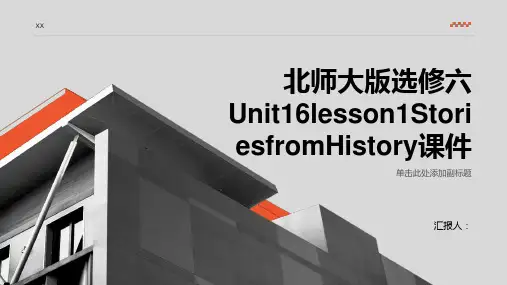
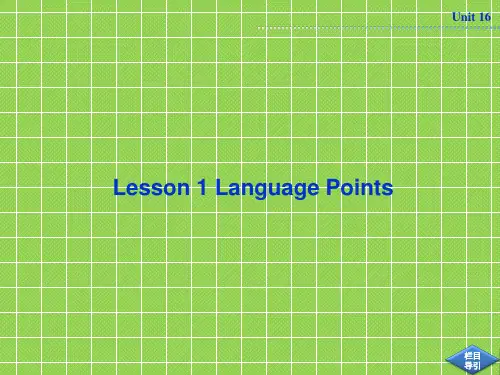
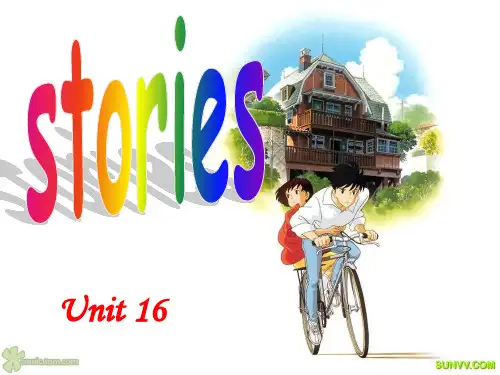
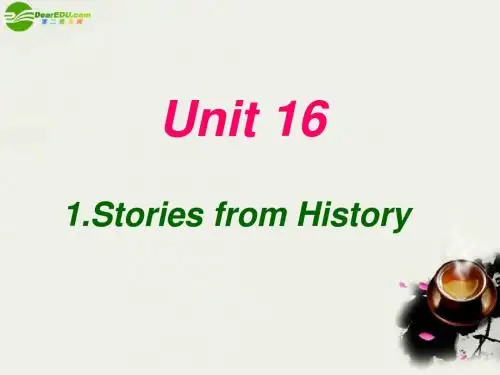
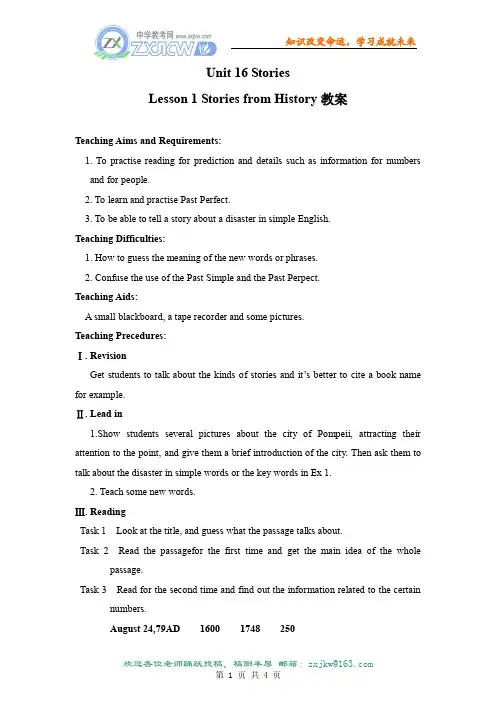
Unit 16 StoriesLesson 1 Stories from History教案Teaching Aims and Requirements:1. To practise reading for prediction and details such as information for numbersand for people.2. To learn and practise Past Perfect.3. To be able to tell a story about a disaster in simple English.Teaching Difficulties:1. How to guess the meaning of the new words or phrases.2. Confuse the use of the Past Simple and the Past Perpect.Teaching Aids:A small blackboard, a tape recorder and some pictures.Teaching Precedures:Ⅰ. RevisionGet students to talk about the kinds of stories and it’s better to cite a book name for example.Ⅱ. Lead in1.Show students several pictures about the city of Pompeii, attracting their attention to the point, and give them a brief introduction of the city. Then ask them to talk about the disaster in simple words or the key words in Ex 1.2. Teach some new words.Ⅲ. ReadingTask 1 Look at the title, and guess what the passage talks about.Task 2 Read the passagefor the first time and get the main idea of the whole passage.Task 3 Read for the second time and find out the information related to the certain numbers.August 24,79AD 1600 1748 250Task 4 Read for the third time and find out the information related to the certain persons.Pliny some scientists tourists one person who is prayinganother person who is trying to get upTask 5 Understanding of the whole passageCheck the students’understanding of the whole passage by answering the following questions:1. What is the article about?2. Why does the article describe Pompeii as a “ time capsule ”?3. Who wrote about the eruption of V esuvius?4. What had Pompeii been like before the eruption?5. What can you see if you walk in the streets of Pompeii today?Task 6 True of False?1. Pliny’s uncle died in the terrible volcanic eruption in Pompeii.2. Pompeii’s ancient architecture,statues,decorated walls and so on impressed thepeople today most.3. When the volcano erupted, the peole in Pompeii were all praying.4. Every year many visitors came to Pompeii to dig out the ancient city and learnabout the ancient world.Ⅳ. Paraphrase1. He had witnessed as a young man…2. The eruption had occurred on August 24th, 79AD.3. The earth began to tremble and a volcano…4. He described a cloud coming down the mountain, blocking out the sun and burying everything in its path.5. Time rewinds.6. Y ou can admire the ancient architectures, statues, decorated walls and authentic objects characteristics of the time.7. One person, sitting alone, looks like he is praying.8. One can only feel sorry and deep sympathy for these once-living statues.9. The city lives on nearly 2,000 years after its loss.10. Time capsuleⅤ.Oral PracticeSummarize the whole passage and get students to retell the story about Pompeii with the help of the information related to the certain numbers and persons.Ⅵ. Go through the grammar focus: past perfect tense ( If time permits )1. Introduce past perfect tense by giving several sentences from the text.2. Give some extra examples with some time adverbs.3. Ask students to do an oral practice for past perfect tense --situationHenry, from London, married Anna from Poland.He once told a reporter that he had never been in love until he met Anna.Suppose you were Henry, what else would you like to say to the reporter?Visit Poland…fall in love with a girl…eat Polish food…want children…spend all his time on one person…talk so openly…Ⅶ.Summary and Homework1. Sum up what we learned in this period briefly.2. Do the exercises on page 52 and 53.Pompeii: *He prayed. The writer toured Pompei in 1960.In modern Italy, V esuvius is close to the large port city of Naples.。
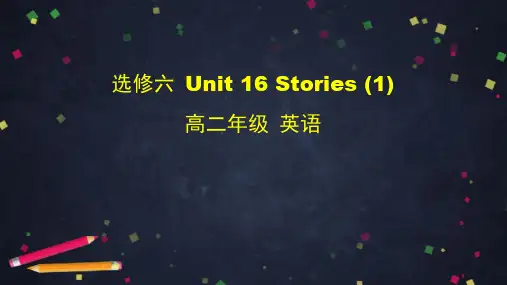
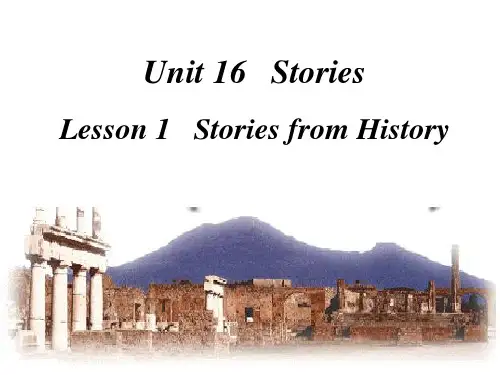
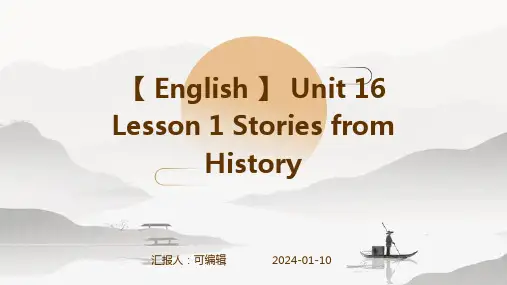
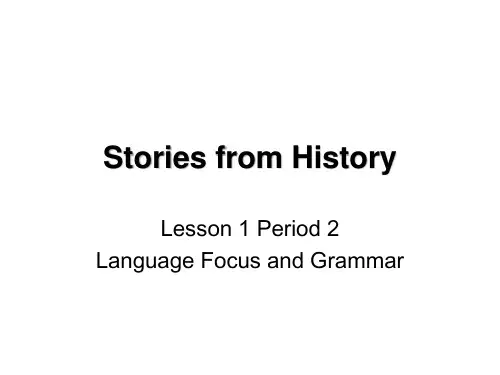
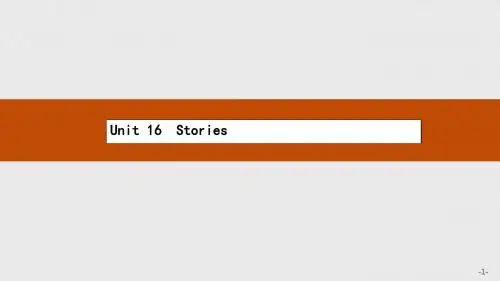
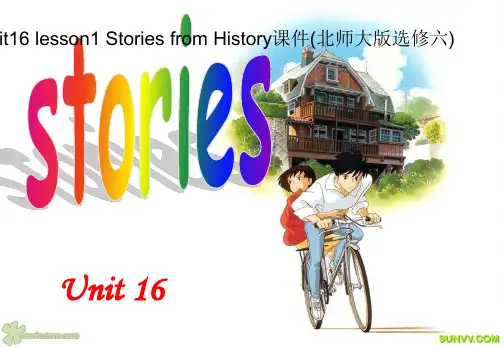
Unit 16 Stories Lesson 1 Stories from History教学设计1Teaching aims:①To help the students to know some kinds of stories②To identify some kinds of stories③To help students to understand the passageTeaching important and difficult points:①To help students to understand the textTeaching procedures:Ⅰ. Warming upTask1: T takes out a story book and ask students two questions:1. Do you like reading stories?2. Can you name some kinds of stories?Task2: Then have a brainstormTask3: Let’s enjoy some stories and identify the kinds of stories in the pictures.Harry Potter FantasyRomance of Three Kingdoms Historical storyⅡ. Pre-readingTask1: ImagineListen to the sound, use your imagination and guess what is happening.V olcanic eruption PompeiiTask2: Have you heard about Pompeii? What do you know about it?Use the following words to make a guess about Pompeii:volcanic eruption, buried, event,disappear, disaster, preserved,destroy, discover, scientistⅢ. ReadingTask1: Listen and read to get the main idea of the passage:It is about a city named Pompeii , which was buried by a volcanic eruption and discovered again by some scientists 1,600 years later.Task2: Second reading:Write down the things in connection with the following people and time expressions:People/time EventPlinyScientistsPeople in PompeiiAugust, 24th, 79 AD:More than 1,600 years later:1748:Today:Task3: Sum up: fill in the blanksⅣ. Post-readingDiscussion:What natural disasters do you know?If you meet one of them, what will you do?Ⅴ. Assignments:1.Read the text again and find out some useful words and expressions.2.Finish the exercise3&4 in Page6-7。
第十六单元第一课教学设计Lesson 1 Stories from History教材分析本课是第16单元第一课。
教材讲述了意大利的庞培城,一个变成了“时间胶囊”城市,公元79年被火山爆发所吞没和1600多年后科学家们再发现它的历史故事。
本课以这个历史故事为话题,展开对故事体裁(Genre)写作结构的了解。
本单元在Warm-up部分已为第一课做了很好的故事话题、结构和词汇方面的铺垫,因此本课可以从Warm-up导入开始,了解故事的种类。
进一步培养学生在进行阅读过程中,了解文章故事的结构和写作特点以便更好地为故事体裁写作输出做准备。
最终达到读得懂、说得出、写得好的目标。
本课篇章不长,也不算难。
词汇短语最好通过学生的课上活动,以及对过去完成时的练习和掌握,不断使词汇及短语复现,从而达到掌握和理解课文的目的。
另外,过去完成时的学习可以通过发现实验的方法加深学生的理解和应用。
即:在语言应用中发现并掌握语法知识。
本课计划两课时完成。
第一课时的重点是通过故事结构(标题,故事事件发生的场景(时间、定点、人物),主体和结论)话题相关信息的了解,运用自己的语言通过讲故事复述课文学习本课及相关的词汇;第二课时的重点是词汇的巩固和语法的发现、归纳、总结和练习,让学生明白过去完成时和过去时的区别以及Have/Get something done词的用法,并能在语境中恰当的应用语言。
教学内容1.话题: Stories from History2.阅读: Pompeii: The city that became a time capsule3.词汇: 重点词汇:volcanic eruption, buried, event, disappear, disaster, preserve, destroy,discover, scientist相关词汇:capsule, tremble, particularly, loss, awesome, rewind, burst, authentic, architecture短语和搭配:block out, in a way, on one’s side, split up, pay rise 4.语法:The Past Perfect; Have/Get something done第一课时First Period教学目标本课结束时,学生能够:1.通过Warm-up的听力,学生能够听懂并知道故事的不同种类。
Lesson 1 Stories from HistoryTime Allocation: 3 periodsTeaching Aims and Requirements:1. To practise reading for prediction and details such as information for numbers and for people.2. To learn and practise the Past Perfect.3. To be able to tell a story about a disaster in simple English.Teaching Difficulties:1. How to guess the meaning of the new words or phrases.2. To practise the use of the Past Simple and the Past Perfect.Teaching Aids: a tape recorder and some pictures.Teaching Precedures:Step 1. Lead in1.Show students several pictures about the city of Pompeii, attracting their attention to the point, and give them a brief introduction of the city. Then ask them to talk about the disaster in simple words or the key words in Ex 1.2. Teach some new words.Step 2. Reading1) Look at the picture, and guess what the passage talks about.2) Read for the first time and get the main idea of the whole passage.3 ) Understanding of the whole passage4) Do Ex.2. C heck the students’ un derstanding of the whole passage by answering the following questions: ……Answers:1. It is about a city called Pompeii. It was buried by a volcanic eruption in 79 AD.2. Because the volcanic eruption preserved buildings, objects and even impressions of people from the time.3. Roman writer Pliny did.4. Before the eruption, Pompeii had been a booming Roman city with temples, markets, restaurants, and theatres.5. Ancient architecture, statues, decorated walls, objects of the time and the impressions of people in their last hours of life.Step 3. Language Points1. witness①vt. 目击He witnessed the accident. 他亲眼看见那个意外事故。
②n.证人, 目击者He is the only witness to the accident. 他是事故的唯一目击者.2. occur vi [occurred ; occurred; occurring]通常指偶然事件的‘发生’, 可与happen通用,但两者均无被动态.eg. That plane crash occurred only minutes after take-off.C.F: take place 通常指有计划的事件‘发生,举行’, 同样无被动态.It occurred to sb. that …某人突然想起…It occurred to them that the twins are quite different from each other in many ways.It occ urred to me that she didn’t know our new address.3. Preserve vt. 保护, 保持, 保存, 保藏eg.Salt preserves food from decay. 盐能防止食物腐烂。
Do more eye exercise to preserve eyesight. 多做眼保健操保护视力.4.Pliny described a cloud coming down the mountain, blocking out the sun and buryingeverything in its path, including whole villages and towns.coming down, blocking out, burying 作宾语补足语;including短语作everything定语5. This particular sad event left a deep impression on Pliny who had lost an uncle in the event. who引导的句子做定语,修饰Pliny。
left a deep impression on 给人留下深刻印象I don’t want to leave any false impression on you.6. Pompeii is like a “time capsule” preserving a frozen moment in history.preserving修饰a “time capsule,做后置定语7. However, much more than buildings and objects, it is the forms of the people who were caught in the disaster that made the city a monument to human history.复原此句为:However, much more than buildings and objects, the forms of the people who were caught in the disaster made the city a monument to human history.①(much)more than (永)不只是…eg.The Dreams of the Red Chambers was more than a novel. It was simply a practical medicine dictionary.在本文中,此句包含一强调句结构(It is …that …)。
强调句子主语。
②get/be caught in 突然遇到,陷入…困境中I was caught in a heavy rain on my way home.③catch sb doing :发现,撞见(某人正在做…)The teacher caught him sleeping in class.Step 4. Grammar--- the Past Perfect TenseI) Implication表示在过去某个特定时间以前发生的动作,一直延续到那个特定时间刚刚结束,或还要继续延续。
但是,决不会延续到现在。
另外,过去完成时是一个相对的时态。
它是与一般过去时相对而言的。
也就是说,在一般情况下,我们不会一启句就用过去完成时;而往往是在交代了"过去的某个特定时间"以后,根据需要和可能才选用过去完成时的。
这种时态主要适用于下面的情况:1. 两个动作都发生在过去,如果要强调它们的先后,先发生的动作用过去完成时,后发生的用一般过去时;如果不强调它们的先后,则都用一般过去时。
She suddenly remembered that she had left her cellular-phone in the taxi.2.过去完成时也用于"间接引语"和"虚拟语气"的句子中She said to me that she had seen that film .If you had come to me yesterday, I would have told you the news.更多句意理解:1. Tom was disappointed that most of the guests had left when he arrived at the party.解析:guests先“离开”,Tom后“到达”。
2. We had learned four thousand new words by the end of last year.解析:根据by短语中的last year得知是到去年年末。
3.They asked me to have a drink with them. I said that it was at least ten years since I had enjoyeda good drink.解析:enjoy至少是发生在10年前。
4. Helen had left her keys in the office so she had to wait until her husband came home.解析:had to wait说明事情发生在过去,“忘带钥匙”的动作发生在“等丈夫回家”之前。
II)Do Exercises Lead the students to finish off all the exercises from Ex.4 till Ex.7Step 5. Summary and Homework1. Sum up what we learned in this period briefly and get students to retell the story about Pompeii with the help of the information related to the certain numbers and persons.2. Do the exercises on page 52 and 53.Pompeii: *He prayed. The writer toured Pompei in 1960.In modern Italy, Vesuvius is close to the large port city of Naples.。